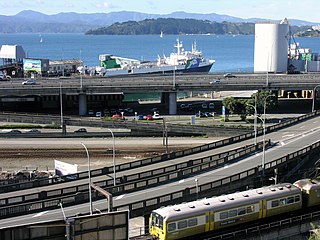
Transport in New Zealand has always faced many challenges, given the country's mountainous topography and a relatively small population, which is located mostly near its long coastline. Before Europeans arrived, Māori either walked or used watercraft on rivers and along the coasts. European shipping and railways revolutionised the transport of goods and people, before themselves being overtaken by road and air transport, which are now the dominant forms. Bulk freight still continues to be transported by coastal shipping and by rail, and there are attempts to (re)introduce public transport as a major transport mode in the larger population centres.
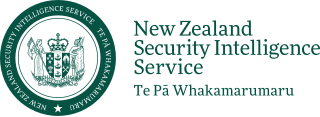
The New Zealand Security Intelligence Service (NZSIS) is New Zealand's primary national intelligence agency. It is responsible for providing information and advising on matters including national security and foreign intelligence. It is headquartered in Wellington and overseen by a Director-General, the Minister of New Zealand Security Intelligence Service, and the parliamentary intelligence and security committee; independent oversight is provided by the Inspector-General of Intelligence and Security.

ANZ Bank New Zealand Limited is a New Zealand banking and financial services company, which operates as a subsidiary of Australia and New Zealand Banking Group Limited of Australia. ANZ is one of New Zealand's big four banks, and is the largest bank in New Zealand with approximately 30% of market share as of March 2021.
Tranz Rail, formally Tranz Rail Holdings Limited, was the main rail operator in New Zealand from 1991 until it was purchased by Toll Holdings in 2003.

Rail transport in New Zealand is an integral part of New Zealand's transport network, with a nationwide network of 4,375.5 km (2,718.8 mi) of track linking most major cities in the North and South Islands, connected by inter-island rail and road ferries. Rail transport in New Zealand has a particular focus on bulk freight exports and imports, with 19 million net tonnes moved by rail annually, accounting for more than half of rail revenue.
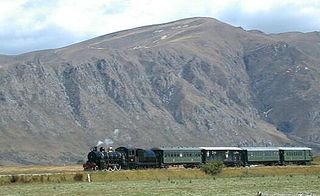
The Kingston Flyer is a vintage steam train in the South Island of New Zealand at the southern end of Lake Wakatipu. It used 14 kilometres of preserved track that once formed a part of the Kingston Branch. Originally, Kingston Flyer was a passenger express train between Kingston, Gore, Invercargill, and less frequently, Dunedin. It was operated by the New Zealand Railways (NZR) from the 1890s to 1957. In 1971, NZR revitalised the service as a tourist venture, later leasing the locomotives and rolling stock in 1982 to a private company. Since then, the Kingston Flyer has been through a number of owners, most recently being owned by the Kingston Flyer Ltd. A group of volunteers has restored the railway, rolling stock and locomotives to service. In July 2021 the Kingston Flyer received resource consent to operate, initially for tour groups.
Tranz Metro was a New Zealand public transport operator. Beginning as the New Zealand Railways Corporation's Cityline division as a result of restructuring in the 1980s, in its final form Tranz Metro was the operator of Metlink's suburban trains owned by the Greater Wellington Regional Council in the Wellington Region of New Zealand.

NatureServe, Inc. is a non-profit organization based in Arlington County, Virginia, US, that provides proprietary wildlife conservation-related data, tools, and services to private and government clients, partner organizations, and the public. NatureServe reports being "headquartered in Arlington, Virginia, with regional offices in four U.S. locations and in Canada." In calendar year 2011 they reported having 86 employees, 6 volunteers, and 15 independent officers.
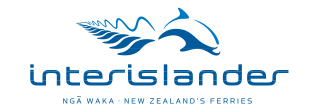
Interislander is a road and rail ferry service across New Zealand's Cook Strait, between Wellington in the North Island and Picton in the South Island. It is owned and operated by state-owned rail operator KiwiRail. Three roll-on roll-off (RORO) vessels operate the 50-nautical-mile route, taking about three hours to complete the crossing.

West Coast Railway was a passenger train company operating in Victoria, Australia that operated services between Melbourne and Warrnambool from September 1993 until August 2004. The travel time for the journey was around 3 hours. This is on average around 30 minutes quicker than the current journeys.

The Capital Connection is a long-distance commuter train operated by KiwiRail between Palmerston North and the capital city of Wellington on the North Island Main Trunk.

The Coastal Pacific is a long-distance passenger train that runs between Picton and Christchurch in the South Island of New Zealand. It is operated by the Great Journeys New Zealand division of KiwiRail. It was called the TranzCoastal from May 2000 until temporarily withdrawn in February 2011. It was the first train to use the new AK class carriages.

The 2006 Progressive Enterprises dispute was an industrial dispute between New Zealand supermarket company Progressive Enterprises and employees represented by the National Distribution Union and the EPMU. On 25 August 2006, over 500 employees at Progressive's four distribution centres began a 48-hour strike supporting a demand for a national collective agreement involving an eight percent wage increase and pay parity between the four centres. On 26 August 2006 the company locked out the strikers indefinitely, suspending operations at its distribution centres, with suppliers delivering goods directly to the supermarkets and also setting up amateur small scale distribution centres in car parks of Countdown supermarkets. The dispute was resolved on 21 September 2006 when Progressive Enterprises agreed to pay parity and a 4.5% wage increase.
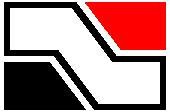
New Zealand Railways Corporation (NZRC) is the state-owned enterprise that owns the land beneath KiwiRail's railway network on behalf of the Crown. The corporation has existed under a number of guises since 1982, when the old New Zealand Railways Department was corporatised followed by deregulation of the land transport sector. In 1986, the Corporation became a State-owned enterprise, required to make a profit. Huge job losses and cutbacks ensued, and the rail network, rail operations and ferry service of the corporation were transferred to New Zealand Rail Limited in 1990. The Corporation retained ownership of the land beneath the railway network, and charged a nominal rental to New Zealand Rail, which was privatised in 1993, and renamed Tranz Rail in 1995. In 2004, following a deal with Tranz Rail's new owners Toll NZ, the Corporation took over responsibility for maintaining and upgrading the rail network once more, trading under the name ONTRACK. Negotiations with Toll over track access charges concluded after four years with no agreement reached, so the government purchased the entire rail and ferry operations, naming the service KiwiRail. ONTRACK's railway infrastructure and employees were then transferred to KiwiRail in 2008, which itself was initially a subsidiary of the corporation. On 31 December 2012, the Corporation once again became the landowner.
The Campaign Against Foreign Control of Aotearoa (CAFCA) is a research and lobbying organisation combatting what it considers the sell-out of New Zealand companies and assets to overseas interests. The organisation evolved from the then-named Campaign Against Foreign Control in New Zealand which began in the early 1970s.
The Securities Commission was an independent Crown entity of the government of New Zealand and the main regulator of investments. It was replaced on 1 May 2011 by the Financial Markets Authority.
KiwiRail Holdings Limited is a New Zealand state-owned enterprise (SOE) responsible for rail operations in New Zealand and operates inter-island ferries. Trading as KiwiRail and headquartered at 604 Great South Road, Ellerslie, KiwiRail is the largest rail transport operator in New Zealand. KiwiRail has business units of KiwiRail Freight, Great Journeys New Zealand and Interislander. The company was formed in 2008 when the government renationalised above-rail operations and inter-island ferry operations, then owned by Toll Holdings. In 2021, the government launched the New Zealand Rail Plan, with funding for rail projects to come from the National Land Transport Fund (NLTF), and with KiwiRail remaining an SOE but paying Track Access Charges (TACs) to use the network.

The New Zealand AK class carriage is a class of 17 cars built by Dunedin's Hillside Workshops for KiwiRail's long-distance passenger operation The Great Journeys of New Zealand. The class consists of 11 AK saloon carriages, three AKP Scenic Plus carriages and four AKC café carriages, supplemented by three AKL luggage vans and four AKV open-air viewing/generator vans converted from AG vans, similar to those previously used on the Coastal Pacific and the TranzAlpine. The AK class are the first new carriages to be built in New Zealand since 1943.

Great Journeys New Zealand is the tourism division of KiwiRail that operate its three Scenic train services. The new division was launched in May 2017 and replaced the former tourism brand KiwiRail Scenic Journeys. It has continuity with the earlier InterCity Rail (1987–1995) and Tranz Scenic (1995–2011).
Laurence Murray Greig is a New Zealand lawyer and jurist. He served as Chief Justice of the Cook Islands, a judge of the High Court of New Zealand, and as Inspector-General of Intelligence and Security.














